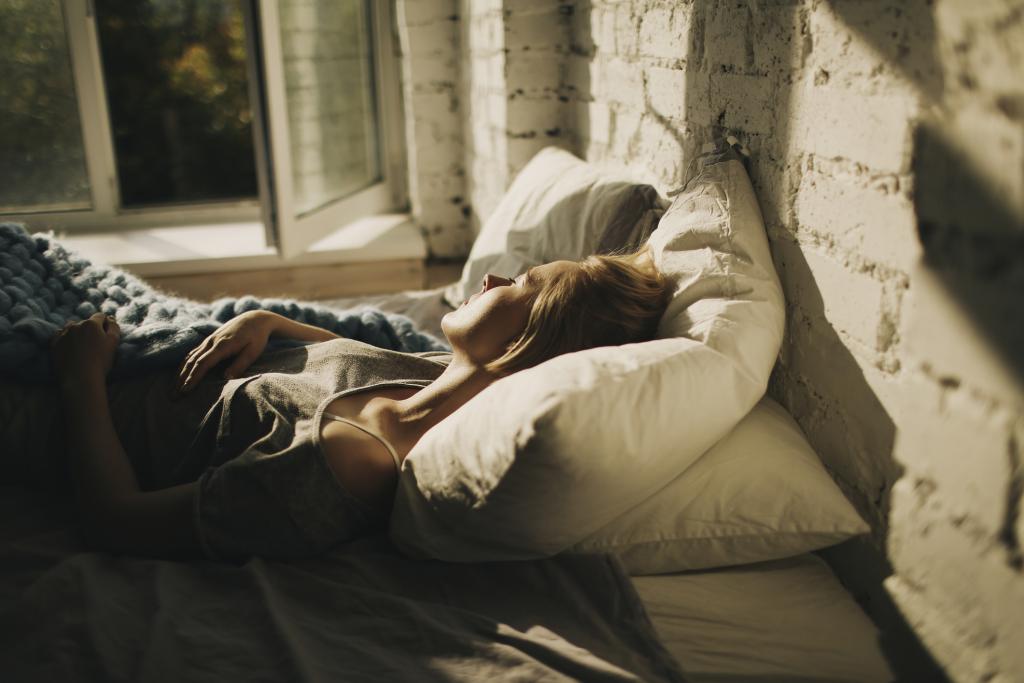You aren’t getting enough sleep – seriously. According to the CDC¹, one in three American adults aren’t getting their recommended amount of shut-eye, which The National Sleep Foundation² reports is seven to nine hours of sleep every night.
When you don’t get enough quality sleep, your brain suffers the biggest blow. Sleep deprivation affects your brain’s processing ability, impairs memory storage, and can, according to the National Institutes of Health³, prevent your brain from clearing toxins.
 To better you and your brain, we’ve gathered a mix of helpful habits, apps, and diet changes that can all help you get a better night’s sleep.
To better you and your brain, we’ve gathered a mix of helpful habits, apps, and diet changes that can all help you get a better night’s sleep.
Develop Good Sleeping Habits
Quality sleep is necessary for everyone, but a good night’s sleep becomes even more important as you age. Older adults tend to wake up more frequently during the night because, as Sleep Education⁴ explains, you produce less melatonin as you get older, which is a hormone that promotes sleep. Developing good sleep habits now can help you continue to sleep well throughout the night as these changes occur.
What you do during the day, especially in the hours right before bedtime, affects your sleep. Here are a few ways to establish healthy sleep habits:
- Go to bed and wake up at the same time every day: Setting a schedule and sticking to it will help your body develop a rhythm and make it easier to get a full seven to nine hours of sleep.
- Get in bed only when you’re drowsy: The psychological frustration of lying in bed without drifting off may keep you awake longer; get up if you aren’t feeling sleepy.
- Use your bed only for sleep and intimate activities: This conditions you to feel tired when you crawl into bed.
- Dim bright lights in the evenings and avoid screens 30 minutes before bed: The National Sleep Foundation⁵ notes that your body’s circadian rhythm is regulated by exposure to light, which stimulates nerve pathways that may keep you awake.
- Limit alcohol consumption: Alcohol suppresses melatonin according to the Sleep Doctor⁶ and can interfere with your sleep stages, leading to restless sleep and fatigue the next day.
Apps That Will Help You Sleep
Some apps have been specifically designed to help you sleep and use a hands-off approach; you’re still encouraged to avoid looking at your phone, but you’ll need to have it nearby.
Sleep Cycle
Sleep Cycle is an intelligent alarm clock that tracks your sleep cycles using motion detection or your phone’s microphone. It uses that data to wake you up at an optimal time so you start the day feeling refreshed, not groggy. Sleep Cycle also offers insight into whether you’re really getting the best sleep possible.
Apple Bedtime
Bedtime is a function of the clock app on the iPhone. It allows you to set a bedtime and a wake time for every day of the week and gives you a reminder when it’s time to hit the hay or climb out of bed. Using this app feature can help you maintain a consistent sleep schedule.
Relax Melodies
Soundscapes and sleep meditations can help you relax as you drift off to sleep. The best part about this app is you can customize the sounds for a personalized experience.
Pzizz
Pzizz is designed to help you sleep better whether you’re getting a full eight hours or taking a power nap. It provides sounds based on psychoacoustic principles to lull you into dreamland. You can choose from basic sounds or layer a voice track over the background music to guide you into a deeper sleep. Pzizz also tracks your listening history so that you can listen to what works over and over again.
Sleep Well Hypnosis
Does a busy mind keep you awake when you lay your head on your pillow? The Sleep Well Hypnosis app provides guided meditations and background sounds to help soothe your conscious and subconscious mind and help the body relax. Choose from voice, sounds, or a sleep booster that provides binaural beats to optimize your brainwave frequency for restful sleep.
Natural Foods and Drinks That Promote Restful Sleep
Some foods are definite sleep killers, like alcohol and heavy foods that could cause indigestion. But did you know that certain foods and beverages may help induce relaxation? Try snacking or sipping on the following food and drinks to improve your sleep:
- Chamomile tea: Chamomile tea contains the antioxidant apigenin, which interacts with neural receptors in a way that decreases anxiety and promotes calmness according to a study published in Molecular Medicine Reports⁷.
- Valerian root: This herbal supplement is one of the most widely used sleep aids in the U.S. and may work by increasing levels of a neurotransmitter that increases drowsiness according to a study published in the American Journal of Medicine⁸.
- Nuts: Eating almonds and walnuts can boost your melatonin levels, helping you stay asleep, says the National Sleep Foundation9.
- Kiwi: Research published in the Asia Pacific Journal of Clinical Nutrition10 found that eating two kiwi fruits an hour before bed may help people fall asleep faster than when they avoid eating anything before bed.
- Tart cherry juice: In addition to important nutrients such as vitamins A and C and manganese, tart cherry juice is high in melatonin and has been studied in The FASEB Journal11 as a treatment for insomnia.
Like anything, it’s always a good idea to be aware of the latest research. We recommend comparing at least 3 or 4 options before making a final decision. Doing a search online is typically the quickest, most thorough way to discover all the pros and cons you need to keep in mind.


